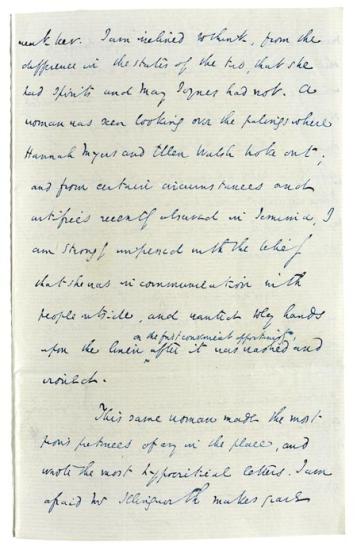Letter 4 | 17 April 1850 | to Angela Burdett-Coutts, page 3

Autograph letter signed, London, 17 April 1850, to Angela Burdett-Coutts
Purchased with the assistance of the Fellows, 1951
In his 1853 essay "Home for Homeless Women," published in his weekly magazine Household Words, Dickens wrote that the Urania Cottage project hoped to achieve success in thirty to fifty percent of its cases. By 1853 it had exceeded this goal: of the fifty-eight women who had passed through the home, thirty were thought to have flourished after emigration. In the case of the other inmates, three had relapsed during the passage to Australia, seven had left the home during the probationary period, seven had fled, and ten had been discharged. In this letter to William Brown, the physician on the Urania Cottage management committee, Dickens commented that one of the expelled women, named Sesina, "would corrupt a Nunnery in a fortnight."
Philanthropy
From 1840 Dickens guided the charitable work of philanthropist Angela Burdett-Coutts (1814–1906), the wealthiest heiress in Victorian Britain. Dickens served as her official almoner and helped to assess the merits of the thousands of letters she received from those seeking financial assistance. He also advised on her plan for improved sanitation in the slums of Westminster and drew her attention and support to the Ragged School Union, which provided education to London's poorest children. A pragmatist, Dickens encouraged Burdett-Coutts to direct her philanthropy toward the causes of distress. In 1847 they founded a home, Urania Cottage, in Shepherd's Bush, as a shelter for homeless women—prostitutes or petty criminals who sought to rehabilitate themselves by learning practical skills and developing self-discipline. Many of the women were assisted to eventually emigrate to one of Britain's colonies to begin a new life. For more than ten years, Dickens administered Urania Cottage on behalf of Burdett-Coutts and played an extremely active role in its day-to-day management.
weak beer. I am inclined to think, from the difference in the states of the two, that she had spirits and Mary Joynes had not. A woman was seen looking over the palings where Hannah Myers and Ellen Walsh broke out; and from certain circumstances and artifices recently observed in Jemima, I am strongly impressed with the belief that she was in communication with people outside, and wanted to lay hands upon the linen on the first convenient opportunity, after it was washed and ironed.
This same woman made the most pious pretences of any in the place, and wrote the most hypocritical letters. I am afraid Mr. Illingworth makes grave